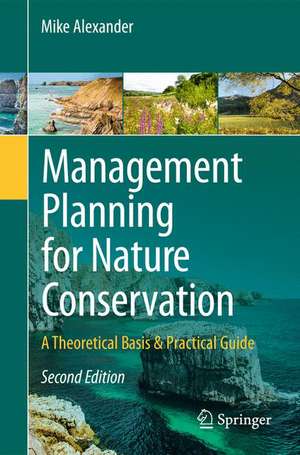Management Planning for Nature Conservation: A Theoretical Basis & Practical Guide
Autor Mike Alexanderen Limba Engleză Paperback – 5 dec 2012
Mike Alexander has long been at the forefront of developing management planning for conservation, with experience ranging from Uganda to Estonia, and from Costa Rica to Wales. He is the General Secretary of the Conservation Management System Consortium, a group of organisations with a common aim of raising standards and developing best practice in conservation management and planning. In 2012 Mike Alexander was elected a Fellow of the Society of Biology in recognition of his contribution to nature conservation and in particular management planning.
This book has drawn on the experiences and expertise of the CMS consortium and other leaders in both conservation research and wildlife management from around the world. It is essential reading for professional conservation managers and any student studying management planning for conservation within a range of degree and postgraduate courses.
Preț: 739.00 lei
Preț vechi: 901.22 lei
-18% Nou
Puncte Express: 1109
Preț estimativ în valută:
141.43€ • 147.11$ • 116.75£
141.43€ • 147.11$ • 116.75£
Carte tipărită la comandă
Livrare economică 14-28 aprilie
Preluare comenzi: 021 569.72.76
Specificații
ISBN-13: 9789400751156
ISBN-10: 940075115X
Pagini: 636
Ilustrații: XXV, 508 p. 117 illus., 99 illus. in color.
Dimensiuni: 155 x 235 x 22 mm
Greutate: 0.77 kg
Ediția:2nd ed. 2013
Editura: SPRINGER NETHERLANDS
Colecția Springer
Locul publicării:Dordrecht, Netherlands
ISBN-10: 940075115X
Pagini: 636
Ilustrații: XXV, 508 p. 117 illus., 99 illus. in color.
Dimensiuni: 155 x 235 x 22 mm
Greutate: 0.77 kg
Ediția:2nd ed. 2013
Editura: SPRINGER NETHERLANDS
Colecția Springer
Locul publicării:Dordrecht, Netherlands
Public țintă
Professional/practitionerCuprins
1. The Need for Planning and Core Management Planning Principles.- 2. Structure, Preparation & Precautionary Principle.- 3. Language and Audience.- 4. Local Communities and Stakeholders.- 5. Survey, Surveillance, Monitoring & Recording.- 6. Adaptive Management, Adaptive Planning, Review and Audit.- 7. The Ecosystem Approach.- 8. Ethics and Conservation Management: Why Conserve Wildlife?.- 9. What do we value?.- 10. Approaches to Conservation Management.- 11. Legislation and Policy.- 12. Description.- 13. Features and Evaluation.- 14. Factors.- 15. Objectives and Performance Indicators for Biological Features.- 16. Rationale for Biological and Other Features.- 17. Action plan.- 18. Access, Tourism & Recreation – Definition and Background.- 19. Preparing an integrated plan for access and recreation.- Case Study 1: Extracts from a conservation management plan.- Case Study 2: Access & recreationsection of the management plan for Cors Caron National Nature Reserve.- Case Study 3: The relationship between species and habitat features.- Case Study 4: Marsh Fritillaries at Rhos Llawrcwrt National Nature Reserve - an example of adaptable planning.- Case Study 5: Computers and Management Planning.
Recenzii
From the book reviews:
“This book is essential for nature conservation planners and managers from academia and various governmental and private agencies. Summing Up: Highly recommended. Upper-division undergraduates through professionals/practitioners.” (R. L. Smith, Choice, Vol. 51 (8), April, 2014)
“I was very happy to recommend this book to my undergraduate and postgraduate students as soon as I obtained a copy. This is a hands-on book, and offers an informative outline of what management planning for conservation entails in practice, including how to develop an action plan, which is a skill that standard academic texts seldom provide. One striking aspect of the book is its logical structure, and plain but authoritative tone.” (Munir Morad, International Journal of Environmental Studies, Vol. 66 (3), 2009)
“This book is essential for nature conservation planners and managers from academia and various governmental and private agencies. Summing Up: Highly recommended. Upper-division undergraduates through professionals/practitioners.” (R. L. Smith, Choice, Vol. 51 (8), April, 2014)
“I was very happy to recommend this book to my undergraduate and postgraduate students as soon as I obtained a copy. This is a hands-on book, and offers an informative outline of what management planning for conservation entails in practice, including how to develop an action plan, which is a skill that standard academic texts seldom provide. One striking aspect of the book is its logical structure, and plain but authoritative tone.” (Munir Morad, International Journal of Environmental Studies, Vol. 66 (3), 2009)
Notă biografică
Mike Alexander originally trained in Fine Arts and Sculpture. He first got involved in conservation working in bird observatories on Skokholm and the Calf of Man, followed by research into oil pollution for the Field Studies Council.
He spent 10 years on Skomer Island - probably the most important and formative period of his life. On leaving the Island he joined the Countryside Council for Wales as a National Nature Reserve (NNR) warden, covering Morfa Harlech and Morfa Dyffryn, Cadair Idris, Rhinog and Coed Llety Walter in Meirioneth. He became concerned at this time by the lack of management planning and systematic recording and in 1987 developed a paper system for planning and recording work on nature reserves. This led to collaboration with James Perrins, a long term friend, resulting eventually in the development of the CMS software and Consortium.
Mike is employed by CCW as Conservation Management Coordinator, with responsibility for defining and obtaining appropriate standards of management on all statutory sites in Wales. His international involvement in recent years has included work for ICONA (Spanish National Parks), Costa Rica National Parks, the Wildlife Institute of India, the Ramsar Bureau, Estonia National Parks etc. Author of "The Guide to Management Planning in Nature Reserves and Protected Areas", recognised by many as a definitive work on the subject. When not actively involved in his full time work (a rare occurrence!), he spends time in wood turning and making furniture. He is also a very keen photographer and has many published photographs to his name. In 2012 Mike Alexander was elected a Fellow of the Society of Biology in recognition of his contribution to nature conservation and in particular management planning
He spent 10 years on Skomer Island - probably the most important and formative period of his life. On leaving the Island he joined the Countryside Council for Wales as a National Nature Reserve (NNR) warden, covering Morfa Harlech and Morfa Dyffryn, Cadair Idris, Rhinog and Coed Llety Walter in Meirioneth. He became concerned at this time by the lack of management planning and systematic recording and in 1987 developed a paper system for planning and recording work on nature reserves. This led to collaboration with James Perrins, a long term friend, resulting eventually in the development of the CMS software and Consortium.
Mike is employed by CCW as Conservation Management Coordinator, with responsibility for defining and obtaining appropriate standards of management on all statutory sites in Wales. His international involvement in recent years has included work for ICONA (Spanish National Parks), Costa Rica National Parks, the Wildlife Institute of India, the Ramsar Bureau, Estonia National Parks etc. Author of "The Guide to Management Planning in Nature Reserves and Protected Areas", recognised by many as a definitive work on the subject. When not actively involved in his full time work (a rare occurrence!), he spends time in wood turning and making furniture. He is also a very keen photographer and has many published photographs to his name. In 2012 Mike Alexander was elected a Fellow of the Society of Biology in recognition of his contribution to nature conservation and in particular management planning
Textul de pe ultima copertă
The first edition of Mike Alexander’s Management Planning for Nature Conservation, brought a new dimension to the modern literature on conservation management. This second edition, a significant enhancement of the original, deals with the development both, conceptual and practical, of adaptive management planning for nature conservation. It is about preparing management plans, and guides the reader through the entire process. Case studies, including a conservation and access plan, demonstrate the planning process in action. This approach to planning can be applied to any place which is managed entirely, or in part, for wildlife. It can be applied to the management of species or habitats in any circumstance, regardless of site designation. The process is fully compatible with the Convention on Biological Diversity’s ‘ecosystem approach’ to conservation management.
Mike Alexander has long been at the forefront of developing management planning for conservation, with experience ranging from Uganda to Estonia, and from Costa Rica to Wales. He is the General Secretary of the Conservation Management System Consortium, a group of organisations with a common aim of raising standards and developing best practice in conservation management and planning. In 2012 Mike Alexander was elected a Fellow of the Society of Biology in recognition of his contribution to nature conservation and in particular management planning.
This book has drawn on the experiences and expertise of the CMS consortium and other leaders in both conservation research and wildlife management from around the world. It is essential reading for professional conservation managers and any student studying management planning for conservation within a range of degree and postgraduate courses.
Mike Alexander has long been at the forefront of developing management planning for conservation, with experience ranging from Uganda to Estonia, and from Costa Rica to Wales. He is the General Secretary of the Conservation Management System Consortium, a group of organisations with a common aim of raising standards and developing best practice in conservation management and planning. In 2012 Mike Alexander was elected a Fellow of the Society of Biology in recognition of his contribution to nature conservation and in particular management planning.
This book has drawn on the experiences and expertise of the CMS consortium and other leaders in both conservation research and wildlife management from around the world. It is essential reading for professional conservation managers and any student studying management planning for conservation within a range of degree and postgraduate courses.
Caracteristici
This is the only text book which deals with integrated adaptive planning for nature conservation The book provides both a complete background to management planning and a step by step guide through the process The book is written specifically for professional conservation managers and students studying management planning for conservation







